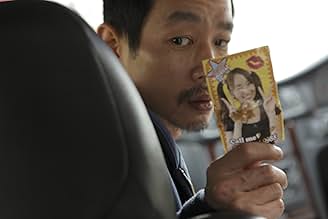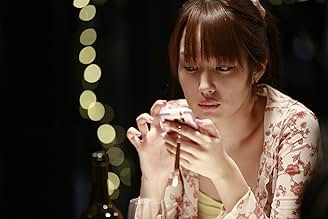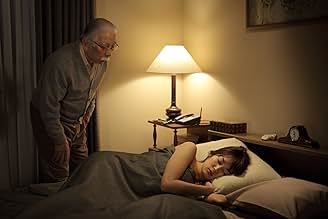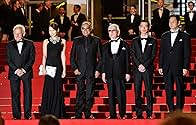NOTE IMDb
7,0/10
14 k
MA NOTE
À Tokyo, une jeune travailleuse du sexe développe une relation inattendue avec un veuf pendant deux jours.À Tokyo, une jeune travailleuse du sexe développe une relation inattendue avec un veuf pendant deux jours.À Tokyo, une jeune travailleuse du sexe développe une relation inattendue avec un veuf pendant deux jours.
- Réalisation
- Scénario
- Casting principal
- Récompenses
- 1 victoire et 6 nominations au total
Kôichi Ôhori
- Taxi Driver
- (as Kouichi Ohori)
Ryota Nakanishi
- Student
- (non crédité)
Avis à la une
This Movie reminds me a lot of "4 months, 3 weeks and 2 days", in its minimalist approach to story telling. It almost isn't a story in the conventional sense; there isn't a clear build up to some resolve, it's more like just a snapshot of someone at a particularly desperate point in their lives with a quiet but rather brutal pathos.
It also reminded me a bit of Anomalisa with its two slightly lost characters finding each other for comfort though here it's more about emotional support.
Cool and leisurely, a lot of it feels just like chat because that's what people are like. I watched this over about four sittings over a period of a few months because it is a movie that really demands that you slow your pace to match its own, but over all I admire the uncompromising, unpretentious tone where there are no easy solutions offered, just the blunt jab of reality delivered without aggression.
It also reminded me a bit of Anomalisa with its two slightly lost characters finding each other for comfort though here it's more about emotional support.
Cool and leisurely, a lot of it feels just like chat because that's what people are like. I watched this over about four sittings over a period of a few months because it is a movie that really demands that you slow your pace to match its own, but over all I admire the uncompromising, unpretentious tone where there are no easy solutions offered, just the blunt jab of reality delivered without aggression.
Like Someone in Love (2012) is a Japanese movie written and directed by the great Iranian filmmaker Abbas Kiarostami. Kiarostami brings his quiet, thoughtful style to a culture that is surely very alien to him. Japanese viewers may note cultural errors in the movie. My thought is that Kiarostami can look beyond cultural differences to universal themes.
The movie, set in Tokyo, stars Rin Takanashi as Akiko, a young provincial woman who is a call girl. (She doesn't walk the streets. She works out of a bar, whose owner arranges the sessions at people's homes.) As the movie opens Akiko is facing two immediate problems. Her jealous boyfriend is on the phone, demanding to know where she is. Akiko is a college student, and her boyfriend is aware of that. He doesn't know that she's a prostitute, but he can sense that something isn't right, and he suspects her of cheating.
Akiko's grandmother is visiting Tokyo that day, and desperately wants to see Akiko. Akiko would love to meet with her, but the bar owner is adamant--she must go out on a call to an important client. The client is Professor Takashi Watanabe, played by Tadasi Okuno. Akiko has no choice but to ignore her grandmother and visit the professor's apartment.
Prof. Watanabe is a gentle, lonely widower. He has prepared a special dinner for Akiko, and he's playing Western music. (It's Ella Fitzgerald singing "Like Someone in Love.") It's more like a seduction scene than a paid sexual encounter.
Akiko spends the night at the professor's home, and he drives her to the university the next morning. It's at that point that the film takes a different turn, because Akiko's violent boyfriend confronts her on the university steps.
All of this action takes place in the first third of the movie. In the remainder of the film, Kiarostami continues to explore this unusual and somewhat threatening love triangle. This interaction among three very different individuals provides a fascinating look into human relationships. Where these relationships will lead isn't always obvious or predictable.
I enjoyed this intelligent, thought-provoking movie. It will work well on DVD. It's worth seeking out and watching.
The movie, set in Tokyo, stars Rin Takanashi as Akiko, a young provincial woman who is a call girl. (She doesn't walk the streets. She works out of a bar, whose owner arranges the sessions at people's homes.) As the movie opens Akiko is facing two immediate problems. Her jealous boyfriend is on the phone, demanding to know where she is. Akiko is a college student, and her boyfriend is aware of that. He doesn't know that she's a prostitute, but he can sense that something isn't right, and he suspects her of cheating.
Akiko's grandmother is visiting Tokyo that day, and desperately wants to see Akiko. Akiko would love to meet with her, but the bar owner is adamant--she must go out on a call to an important client. The client is Professor Takashi Watanabe, played by Tadasi Okuno. Akiko has no choice but to ignore her grandmother and visit the professor's apartment.
Prof. Watanabe is a gentle, lonely widower. He has prepared a special dinner for Akiko, and he's playing Western music. (It's Ella Fitzgerald singing "Like Someone in Love.") It's more like a seduction scene than a paid sexual encounter.
Akiko spends the night at the professor's home, and he drives her to the university the next morning. It's at that point that the film takes a different turn, because Akiko's violent boyfriend confronts her on the university steps.
All of this action takes place in the first third of the movie. In the remainder of the film, Kiarostami continues to explore this unusual and somewhat threatening love triangle. This interaction among three very different individuals provides a fascinating look into human relationships. Where these relationships will lead isn't always obvious or predictable.
I enjoyed this intelligent, thought-provoking movie. It will work well on DVD. It's worth seeking out and watching.
A vignette of some pretty sad people whose lives intersect in awkward ways over the course of a day. There's an escort/prostitute (Rin Takanashi), who isn't able to see the grandmother who's made a special trip to Tokyo to meet her, because she's going off to meet a client old enough to be her grandfather (Tadashi Okuno). He's a widower who used to teach, and struggles to get her to do the things he planned - drink some wine, eat the food he prepared, and talk - as instead she just wants to go to sleep. Then there's her troubled boyfriend (Ryo Kase), a guy who's in love with her but senses her distance and suspects she's up to something, heightening his jealousy and clinginess. He actually meets the older man the following day and assumes he's her grandfather, resulting in a strained conversation where he gets some advice. Even the nosy neighbor (Mihiko Suzuki) tells of how her love was unrequited and she's now cooped up, caring for her disabled brother.
They're all a bit broken, each in their own way, and yet Kiarostami allows each to engage in thoughtful dialogue that shows their humanity, and that they're not simply objects of pity. It's in those moments that I liked the film the most. I have to say, though, that its quiet style lagged a bit as it played out, and the ending was rather abrupt and unresolved. The quality of the filmmaking was high, and I could really feel myself on the streets of Tokyo at night and in the heads of these people, but the story wasn't particularly compelling to me, so I was left feeling it was a near miss.
They're all a bit broken, each in their own way, and yet Kiarostami allows each to engage in thoughtful dialogue that shows their humanity, and that they're not simply objects of pity. It's in those moments that I liked the film the most. I have to say, though, that its quiet style lagged a bit as it played out, and the ending was rather abrupt and unresolved. The quality of the filmmaking was high, and I could really feel myself on the streets of Tokyo at night and in the heads of these people, but the story wasn't particularly compelling to me, so I was left feeling it was a near miss.
In Tokyo, a young prostitute (Rin Takanashi) develops an unexpected connection with a widower (Tadashi Okuno) over a period of two days.
At this point in his career, Abbas Kiarostami had been directing films for forty years, so he is no amateur. But it might be a bit of a new beginning, filming in Tokyo with an all-Japanese cast. In fact, had one not known better, they might assume the director was Japanese. What do these two worldviews create when blended?
Professor Nico Baumbach makes much of this cultural difference (and rightfully so), saying Kiarostami's foreign immersion "heightens in a new way the sense of the filmmaker as spectator", but is then quick to point out that despite this, we are not alienated from our subjects. The experience of distance "becomes the condition for an emotional connection that otherwise would not have been possible."
The film is also, in short, beautifully shot, with glorious cinematography. This is the sort of film, with its style and charismatic lead actress that one could watch for hours regardless of plot or substance. Critic David Denby says it more eloquently when he writes, "The cinematography is clear and hard-focused, and the editing produces long, flowing passages. This exquisitely made, elusive film has a lulling rhythm and a melancholy charm."
At this point in his career, Abbas Kiarostami had been directing films for forty years, so he is no amateur. But it might be a bit of a new beginning, filming in Tokyo with an all-Japanese cast. In fact, had one not known better, they might assume the director was Japanese. What do these two worldviews create when blended?
Professor Nico Baumbach makes much of this cultural difference (and rightfully so), saying Kiarostami's foreign immersion "heightens in a new way the sense of the filmmaker as spectator", but is then quick to point out that despite this, we are not alienated from our subjects. The experience of distance "becomes the condition for an emotional connection that otherwise would not have been possible."
The film is also, in short, beautifully shot, with glorious cinematography. This is the sort of film, with its style and charismatic lead actress that one could watch for hours regardless of plot or substance. Critic David Denby says it more eloquently when he writes, "The cinematography is clear and hard-focused, and the editing produces long, flowing passages. This exquisitely made, elusive film has a lulling rhythm and a melancholy charm."
This could have been a great film since all the necessary elements are already there. The viewers can feel that they are in expert hands but unfortunately, director Abbas Kiarostami's need to make the viewer appreciate his genius does not work in the film's favor. Take the first scene for instance. I was very annoyed that the camera work made me feel a dissonance between what I saw & what I heard. Perhaps in his clever way, the director was trying to hint that nothing is as it seems. I don't know what his intentions were but I didn't care for his tricks.
Anyway, moving on with the story, we surmise that the young & beautiful Akiko has a possessive & jealous boyfriend & is being forced by her boss/pimp into an difficult position that she's unable to get out of. The scene with her cab circling around her waiting grandma under the statue is so beautifully done that instantly my ambiguity towards Akiko vanished & I wanted this unhappy young woman to somehow find a way out of her predicament. The client is an old & retired academic who wanted to spend some time with Akiko. It is hinted that she bears a resemblance to his own granddaughter. She's however too exhausted to eat or talk, & goes straight to sleep. The old man lets her rest & in the morning drives her to the College so that she can appear for her exam. There he meets her fiance, Noriaki, who tries to come across as a decent young man. He mistakes the old man for Akiko's grandpa. Noriaki feels that he's in love with her but the wise old man can sense that all's not well between the young lovers & says that they are both too young to marry. Noriaki is nice enough to the old man but the latter can see that Noriaki is uncouth, has no interest in education & is chauvinistic to the point that he feels that once he marries Akiko, she would have to give in to all his demands. He has a low self esteem, is irrational, desperate, delusional, & obviously not the brightest bulb in the bunch. His fiancee has been avoiding him & he has his suspicions regarding Akiko's work but is unwilling to see the facts. However, when he is faced with the truth, he reacts in a very volatile manner. The viewer along with Akiko & 'grandpa' feel frustrated that more than anything else, her unfortunate liaison with this seemingly harmless but actually deranged & aggressive man may doom her life forever.
Anyway, moving on with the story, we surmise that the young & beautiful Akiko has a possessive & jealous boyfriend & is being forced by her boss/pimp into an difficult position that she's unable to get out of. The scene with her cab circling around her waiting grandma under the statue is so beautifully done that instantly my ambiguity towards Akiko vanished & I wanted this unhappy young woman to somehow find a way out of her predicament. The client is an old & retired academic who wanted to spend some time with Akiko. It is hinted that she bears a resemblance to his own granddaughter. She's however too exhausted to eat or talk, & goes straight to sleep. The old man lets her rest & in the morning drives her to the College so that she can appear for her exam. There he meets her fiance, Noriaki, who tries to come across as a decent young man. He mistakes the old man for Akiko's grandpa. Noriaki feels that he's in love with her but the wise old man can sense that all's not well between the young lovers & says that they are both too young to marry. Noriaki is nice enough to the old man but the latter can see that Noriaki is uncouth, has no interest in education & is chauvinistic to the point that he feels that once he marries Akiko, she would have to give in to all his demands. He has a low self esteem, is irrational, desperate, delusional, & obviously not the brightest bulb in the bunch. His fiancee has been avoiding him & he has his suspicions regarding Akiko's work but is unwilling to see the facts. However, when he is faced with the truth, he reacts in a very volatile manner. The viewer along with Akiko & 'grandpa' feel frustrated that more than anything else, her unfortunate liaison with this seemingly harmless but actually deranged & aggressive man may doom her life forever.
Le saviez-vous
- AnecdotesIn the late 1990s Abbas Kiarostami was driving late at night while on a visit to Tokyo and witnessed a young girl on the side of the street dressed as a bride. In the years following, while visiting Tokyo to promote other films, he realized that he was always looking for that same girl because she had left such an impression but that he would never likely notice her again in real life because she wouldn't be wearing the same dress. This experience became the basis for the film.
- ConnexionsFeatured in At the Movies: Cannes Film Festival 2012 (2012)
Meilleurs choix
Connectez-vous pour évaluer et suivre la liste de favoris afin de recevoir des recommandations personnalisées
- How long is Like Someone in Love?Alimenté par Alexa
Détails
- Date de sortie
- Pays d’origine
- Sites officiels
- Langue
- Aussi connu sous le nom de
- The End
- Lieux de tournage
- Shizuoka, Japon(Shizuoka Station)
- Sociétés de production
- Voir plus de crédits d'entreprise sur IMDbPro
Box-office
- Montant brut aux États-Unis et au Canada
- 239 056 $US
- Week-end de sortie aux États-Unis et au Canada
- 21 813 $US
- 17 févr. 2013
- Montant brut mondial
- 562 878 $US
- Durée1 heure 49 minutes
- Couleur
- Mixage
- Rapport de forme
- 1.66 : 1
Contribuer à cette page
Suggérer une modification ou ajouter du contenu manquant





























